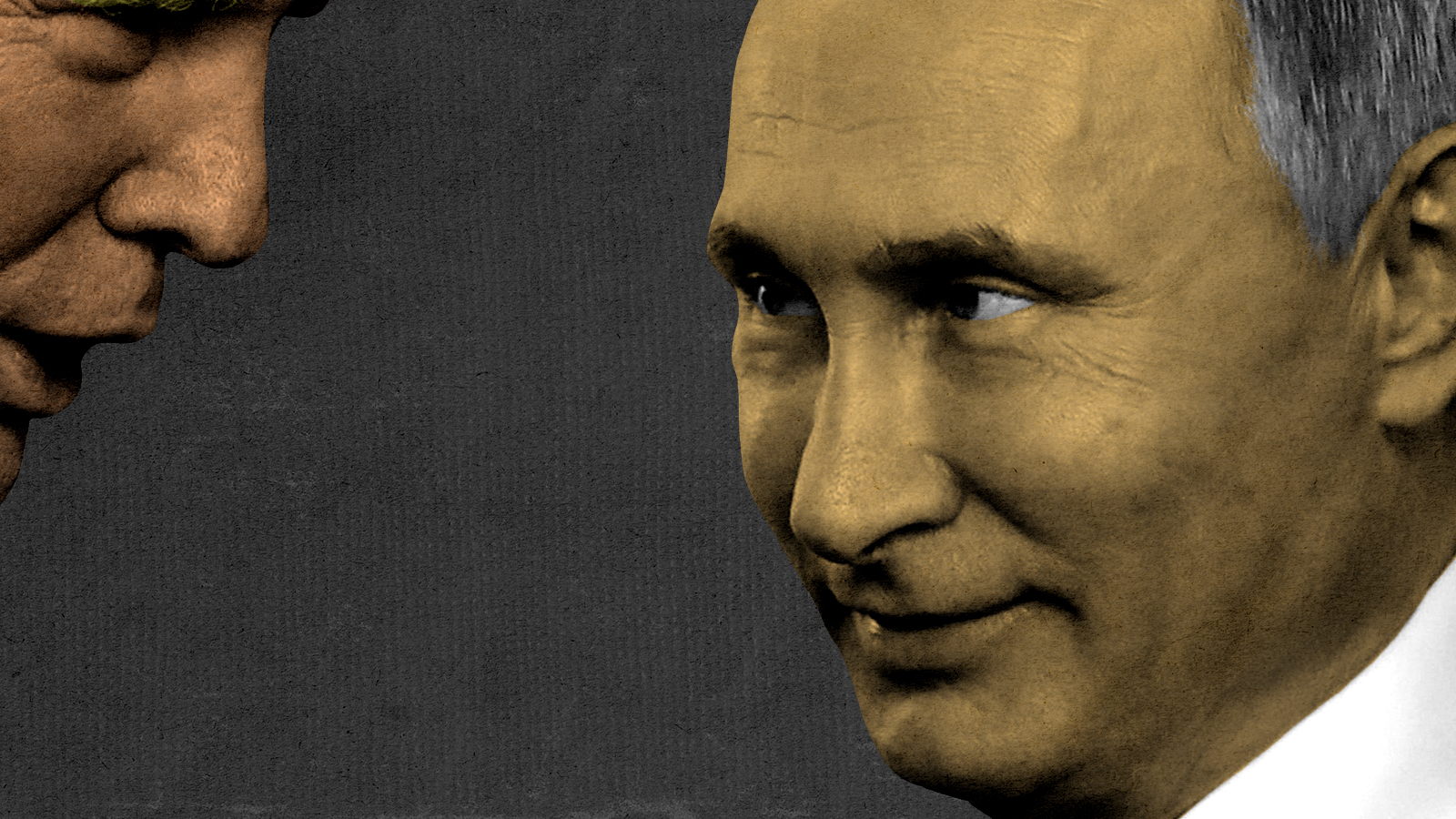The real reason Putin played a pussycat during the Trump presidency


A free daily email with the biggest news stories of the day – and the best features from TheWeek.com
You are now subscribed
Your newsletter sign-up was successful
Republicans have long had a toughness fetish. Going back to the early days of the Cold War, its flip side has been the insinuation that Democrats are weaklings ready to sell out the country to its enemies, with the GOP eager to serve proudly and unapologetically as America's lone defenders abroad.
No one should be surprised that the script has already been updated to account for recent distressing events on the border separating Russia and Ukraine.
Late last week, conservative talk-show host Hugh Hewitt observed in a tweet that "the tyrant Putin invaded Ukraine in 2014 and will do so again in 2022 but did not do so between 2017 and 2020." Without mentioning his name, Hewitt implied Putin became a pussycat because of Donald Trump's steadfast leadership as president.
The Week
Escape your echo chamber. Get the facts behind the news, plus analysis from multiple perspectives.

Sign up for The Week's Free Newsletters
From our morning news briefing to a weekly Good News Newsletter, get the best of The Week delivered directly to your inbox.
From our morning news briefing to a weekly Good News Newsletter, get the best of The Week delivered directly to your inbox.
But wait — wasn't Trump Putin's lapdog for the entirety of his presidency, famously refusing to say anything remotely critical about him and even siding with Putin's denial of Russian interference in the 2016 election against evidence provided by America's own intelligence services?
No doubt realizing the absurdity of the claim, National Review's Rich Lowry (and others) leapt in a few days later to add a layer of nuance to the assertion. It's not that Trump was tougher than President Biden, but that he was more erratic: "The sheer unpredictably of Trump, his anger at being defied or disrespected, his willingness to take the occasional big risk (the Soleimani strike), all had to make Putin frightened or wary of him in a way that he simply isn't of Joe Biden."
There may be some truth in this revision of the thesis. Trump was indeed volatile, impulsive, and capricious. It's certainly possible that Putin feared a move against Ukraine could spark a massive military response from Trump.
But it's far more likely he hoped for something very different. As Jonathan Last pointedly suggested on Tuesday in his newsletter for The Bulwark, Trump expressed his desire on numerous occasions for the United States to withdraw from NATO altogether. He did so while campaigning for president in 2016. He did so as president. And apparently, he even made clear to advisers he hoped to make it a reality after he won re-election in 2020.
A free daily email with the biggest news stories of the day – and the best features from TheWeek.com
Since such a withdrawal is Putin's fondest wish, it makes far greater sense to suppose his relative restraint during the Trump presidency was a function of a reasonable expectation he might get everything he wanted without having to fire a shot. Only now, with a less … unorthodox American president in charge, has war become Putin's only means of advancing his more immediate aim of ensuring NATO moves no closer to Russian territory.
Putin didn't play nice guy from 2017 to 2020 because he was afraid of Donald Trump. He did so because he knew he had nothing to fear from the fanboy in the Oval Office.
Damon Linker is a senior correspondent at TheWeek.com. He is also a former contributing editor at The New Republic and the author of The Theocons and The Religious Test.
-
 What to know before filing your own taxes for the first time
What to know before filing your own taxes for the first timethe explainer Tackle this financial milestone with confidence
-
 The biggest box office flops of the 21st century
The biggest box office flops of the 21st centuryin depth Unnecessary remakes and turgid, expensive CGI-fests highlight this list of these most notorious box-office losers
-
 What are the best investments for beginners?
What are the best investments for beginners?The Explainer Stocks and ETFs and bonds, oh my
-
 Trump’s EPA kills legal basis for federal climate policy
Trump’s EPA kills legal basis for federal climate policySpeed Read The government’s authority to regulate several planet-warming pollutants has been repealed
-
 House votes to end Trump’s Canada tariffs
House votes to end Trump’s Canada tariffsSpeed Read Six Republicans joined with Democrats to repeal the president’s tariffs
-
 Bondi, Democrats clash over Epstein in hearing
Bondi, Democrats clash over Epstein in hearingSpeed Read Attorney General Pam Bondi ignored survivors of convicted sex offender Jeffrey Epstein and demanded that Democrats apologize to Trump
-
 Judge blocks Trump suit for Michigan voter rolls
Judge blocks Trump suit for Michigan voter rollsSpeed Read A Trump-appointed federal judge rejected the administration’s demand for voters’ personal data
-
 US to send 200 troops to Nigeria to train army
US to send 200 troops to Nigeria to train armySpeed Read Trump has accused the West African government of failing to protect Christians from terrorist attacks
-
 Grand jury rejects charging 6 Democrats for ‘orders’ video
Grand jury rejects charging 6 Democrats for ‘orders’ videoSpeed Read The jury refused to indict Democratic lawmakers for a video in which they urged military members to resist illegal orders
-
 Big-time money squabbles: the conflict over California’s proposed billionaire tax
Big-time money squabbles: the conflict over California’s proposed billionaire taxTalking Points Californians worth more than $1.1 billion would pay a one-time 5% tax
-
 Trump links funding to name on Penn Station
Trump links funding to name on Penn StationSpeed Read Trump “can restart the funding with a snap of his fingers,” a Schumer insider said
